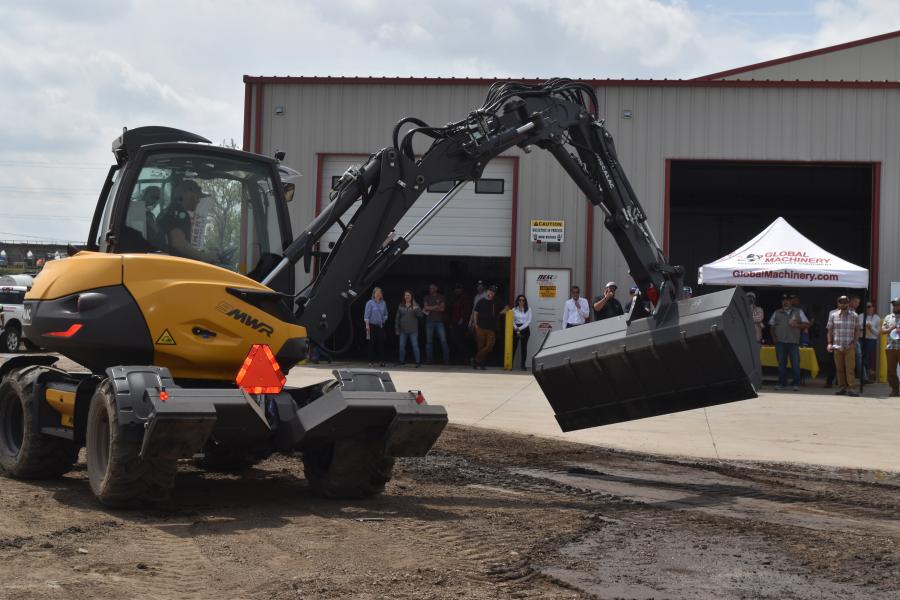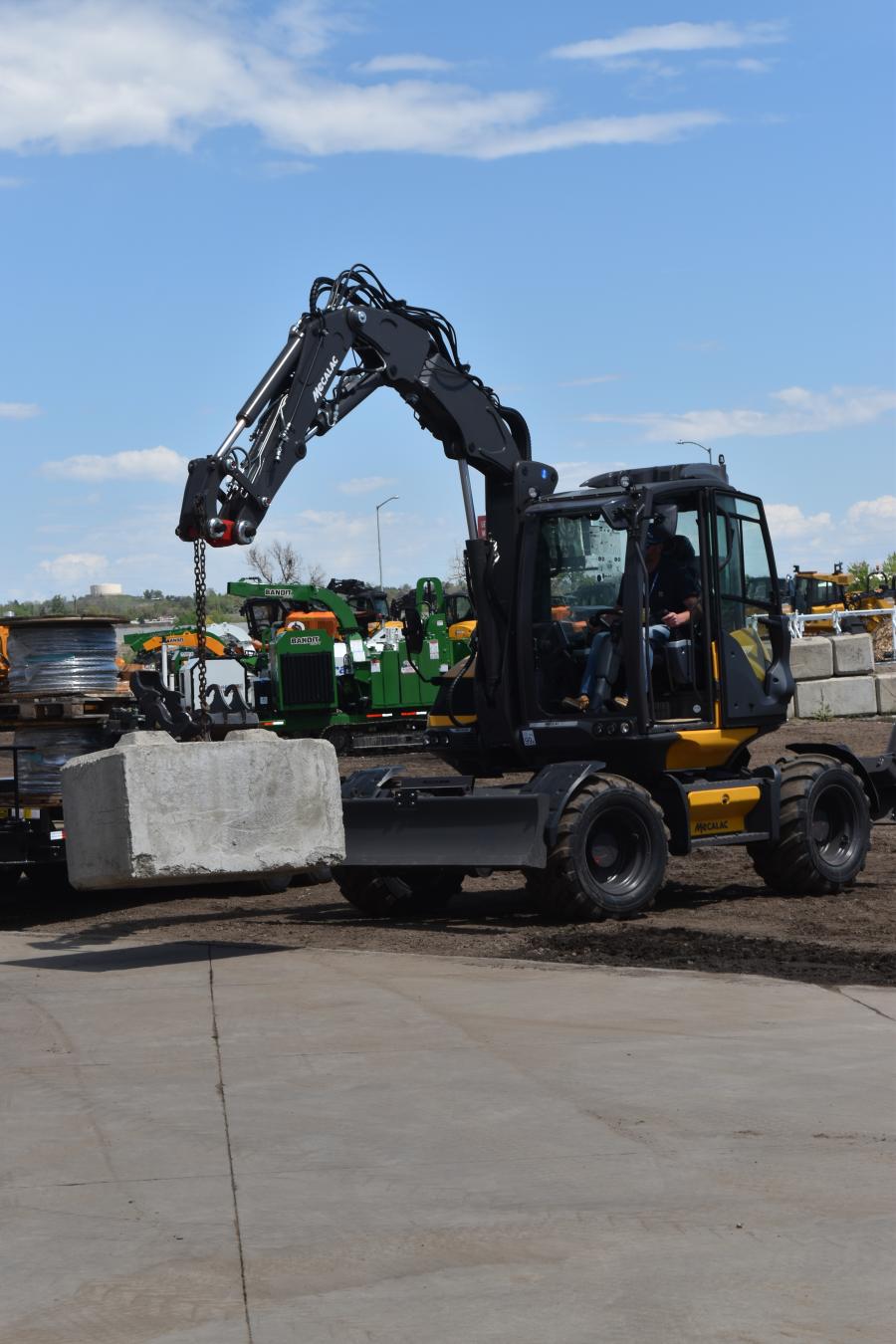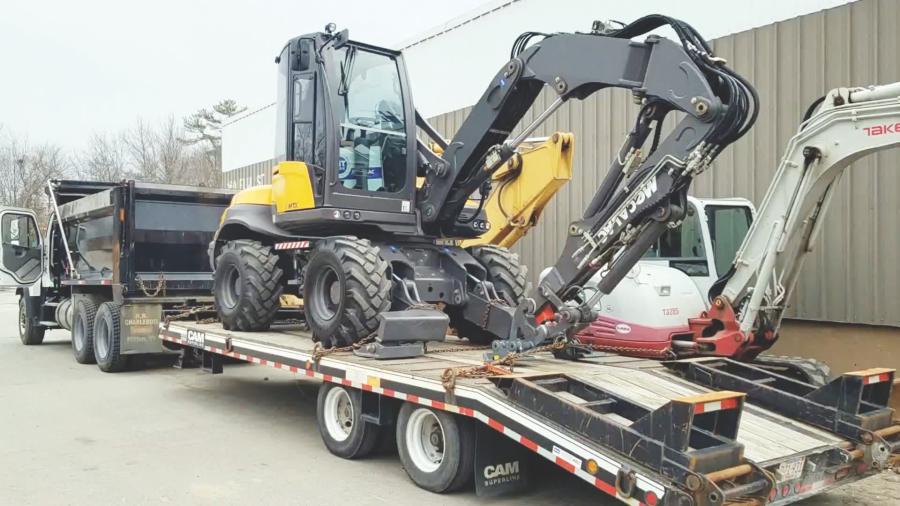
Wed December 13, 2023
CEG
For decades, European contractors have been finding increased utilization for the wheeled excavator and in many cases, in applications that have never been seen in the United States. In recent years, this has been particularly true for the compact wheeled excavator.
It's not unusual for innovation in the excavating trades to begin in Europe and work its way to North America. Take the tiltrotator as an example. In parts of Europe the majority of excavators sold are equipped with a tiltrotator, employing technology that is just now starting to achieve momentum in the United States.
What has been driving the increased utilization of the compact wheeled excavator in Europe?
- Mobility — wheeled machines can be driven down the highway without surface damage, eliminating the need for additional transportation equipment and reducing logistical challenges.
- Reduced Ground Damage — in delicate environments, rubber-tired excavators cause minimal ground damage and distribute the weight of the machine more evenly, reducing impact on ground surface, making them an ideal tool in parks and historical areas and for any environment where surface preservation is essential.
- Improved Fuel Efficiency — reduced weight of rubber tires when compared with steel tracks converts to lower fuel consumption.
- Versatility and Maneuverability — these machines navigate well through confined spaces and challenging terrains with ease. A compact design with all-wheel steer and 360-degree rotation enable operators to work in very tight areas that would often be a challenge in urban settings with older infrastructure.
- Attachment Versatility — rubber-tired excavators can be equipped with virtually any attachment that a tracked machine can handle, including all types of buckets, hammers, grapples and augers for digging.
- Urban Construction Adaptation — in Europe, construction projects often require precision work with minimal to no disruption to nearby infrastructure. Rubber-tired machines adapt well to these scenarios with reduced ground pressure and noise levels.
- Road Construction and Maintenance — this application is already being used in parts of the United States. Rubber-tired machines are ideal for installing road barriers, repairing damaged pavement and other road work … again, causing minimal surface damage and the ability to quickly move from one site to another.
Several companies are now leading the way in importing these compact workhorses into the United States, one of which is Mecalac with its MWR series wheeled excavators.
The Mecalac machines are available in four different sizes:
- 7MWR weighing 16,000 lbs.
- 9MWR weighing 17,000 lbs. with a back blade, giving it the ability to push as well as dig.
- 11MWR weighing 24,000 lbs., also equipped with a back blade.
- 15MWR weighing 34,000 lbs., also equipped with a back blade.

Mecalac, a relative newcomer to the U.S. market, has long been held in high esteem in Europe as being a leader in technology, and is rapidly gaining the same reputation in North America.
The Mecalac MWR is not simply a tracked excavator that was redesigned to add wheels. The MWR was designed from the ground up to be a wheeled excavator. This design has given the machine a very low profile with service access points that are literally just a couple of feet from the ground.
A very low center of gravity makes the Mecalac MWR the most stable wheeled excavator in its class on the market, according to the manufacturer. Maintenance also is safe and efficient, with every essential access point reachable with your feet on the ground. The cab is 20 percent lower than other machines, making the cab easily accessible to the driver.
The Mecalac operator technology is user-friendly due to a unique central selector. The operator can switch into road, operating, or parking modes in a single movement rather than having to go through several steps.
All Mecalac MWR machines feature the 360-degree ISO stability, which means machine stability remains the same regardless of the rotation angle of the upper carriage. All MWR machines are equipped with all-wheel steering, allowing operators to practically turn on the spot, the manufacturer said.
The Mecalac unique multi-segmented boom configuration allows the machine to have reach combined with lifting power that's never before been seen in a machine its size, the manufacturer added.
Growing Demand
Geofrey Andrews, a product specialist of Mecalac, is tasked with expanding the market for wheeled excavators in North America and is finding that resistance to the concept is lessening.
"Municipalities are opting to purchase wheeled excavators to accomplish their excavating needs because it is so much easier to drive a wheeled excavator that is capable of speeds over 20 miles an hour to the site than it is to deal with all of the hassle of loading, transporting and unloading a tracked machine.

"Some people would argue that you can accomplish much the same task with a tractor loader backhoe. However, there are some distinct advantages that the Mecalac MWR has over a tractor loader backhoe. Try driving 20 to 25 miles an hour down the road with a tractor loader backhoe. The machine becomes almost impossible to handle.
"Once you get to the site, you have to deploy your downriggers and they take up a lot of real estate. The fact that the boom is center-mounted becomes a major issue from a visibility standpoint. Operators must constantly look around the boom to see what they are digging. And with the backhoe, you can only swing 180 degrees left and right. If you're picking up a load of material, your truck has to be beside you or in front of you and you have to be able to reach out long enough to get the cast of material into the truck and that's not necessarily always an option. With our wheeled machine, the truck can be just about anywhere, even behind the excavator and receive a load. It adds an awful lot of flexibility to the site."
The loader aspect of a tractor loader backhoe is very impractical, Andrews added.
"The loader capacity is a yard and a quarter to a yard and a half. Every time you pick up a load, the operator has to be very conscious of that whole backhoe that's behind him or her, which can be very cumbersome. The tractor loader backhoe original design was a farm tractor with a loader attachment and a backhoe attachment put on a machine that was really built for pulling, not digging."
Ultimately, Andrews said, with a wheeled excavator with 360-degree continuous slew, operators can load more quickly, more efficiently and take up less space on a job site, which is exactly why more and more contractors are finding high value in using Mecalac equipment.
Read more about Mecalac wheeled excavators.
This story also appears on Construction Equipment Guide.
 Aggregate Equipment
Aggregate Equipment Articles
Articles Sign up for Updates
Sign up for Updates Sell Your Machines
Sell Your Machines

 Aggregate Equipment
Aggregate Equipment Aggregate Dealers
Aggregate Dealers Aggregate Articles
Aggregate Articles Sign up for Updates
Sign up for Updates Sell Your Machines
Sell Your Machines